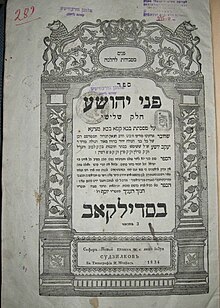Jacob Yehoshua Falk
Jakob Jehoschua Falk (Hebrew יעקב יהושע פאלק; born December 19, 1680 in Cracow ; died January 16, 1756 in Offenbach am Main ) was a rabbi and chief rabbi of Frankfurt am Main and Lemberg and an important Talmudist . After his main work he is known under the name Pne Yehoshua .
life and work
Youth and education
Falk was taught by Jewish scribes in Lemberg, Poland. On his mother's side, he was a grandson of Rabbi Joschua Höschel ben Joseph, who lived in Cracow (born around 1578; died August 16, 1648). In 1702 he lost his mother, young wife and young child in a gunpowder explosion that completely destroyed the family home in Lviv. He himself only barely survived this misfortune: He was buried and vowed that if he survived he would write a book, from which his work Pne Yehoshua emerged. The Kotzker Rebbe narrates that Pnej Yehoshua had learned the entire Talmud thirty-six times before he began to write.
Functions
He was a great Torah scholar from a young age. He was first appointed as a rabbi in the Galician towns of Tarli and Lesko , in 1717 he replaced Rabbi Zwi Hirsch ben Jakob Aschkenasi as chief rabbi of Lemberg, who had recommended him for this position.
In 1731 he was called to Berlin , where he took action against the influential Veitel Heine Ephraim . Towards the end of his tenure in 1734 he was therefore urged prematurely to give up his office. He then became a rabbi in Metz , Lorraine , an office he held for seven years. He was then appointed Chief Rabbi of Frankfurt am Main, where he was confronted with differences within the diverging Jewish community as well as with anti-Semitic accusations from Frankfurt city leaders. Both of these made his term of office difficult. In the dispute between Jacob Emden and Jonathan Eybeschütz that had been going on for years , Falk took a stand against Eybeschütz and in 1750 was ultimately forced to leave Frankfurt am Main and resign from his office.
After several years of wandering from town to town, he settled in Worms for a few years , which also had a very important Jewish community. Finally he was called again to Frankfurt am Main, but his opponents there prevented him from preaching in the synagogue , so he left the city again.
reputation
In his day, Falk was considered one of the best experts on the Talmud . His book publication with commentaries and stories on the Talmud under the title Pene Yehoshua is considered one of the classics of the Acharonim era and still serves as an important standard work for the study of the Talmud, which can be found in most yeshivot . It was written in four parts, two of which were published in Frankfurt am Main (1752). The third part (published in 1766) with his Pesak bet-Din Hadash and the fourth part (published in 1780) with supplementary Talmudic stories about Tur Hoshen Mishpat and Likkutim were published in Fürth . However, his commentary on the Pentateuch is not available in print.
Tomb
Falk died in Offenbach am Main at the age of 75. He was buried in the Jewish cemetery in Frankfurt am Main. His tombstone is now placed on the local grove of honor. The inscription can be called up from a database via the link in the individual records.
literature
- Solomon Schechter , Max Seligsohn: Jacob Joshua Ben Zebi Hirsch. In: Jewish Encyclopedia.
- Sid Leiman: When a Rabbi Is Accused of Heresy: The Stance of Rabbi Jacob Joshua Falk in the Emden-Eibeschuetz Controversy. Rabbinic Culture and Its Critics. Detroit 2008. pp. 435-456.
- Constantin von Wurzbach : Hirsch, Josua . In: Biographisches Lexikon des Kaiserthums Oesterreich . 9th part. Imperial and Royal Court and State Printing Office, Vienna 1863, p. 52 ( digitized version ).
Web links
- Jewish Encyclopedia (English)
Individual evidence
- ↑ Jacob Joshua Ben Zebi Hirsch on: jewishencyclopedia.com
- ^ Gravestone inscription Jaakow Jehoschua in Hebrew / Ger. on: steinheim-institut.de
- ↑ Sid Leiman, Professor, Ph. D., Brooklyn College, New York, USA
| personal data | |
|---|---|
| SURNAME | Falk, Jacob Yehoshua |
| BRIEF DESCRIPTION | Chief Rabbi of Frankfurt am Main and Lemberg |
| DATE OF BIRTH | December 19, 1680 |
| PLACE OF BIRTH | Krakow |
| DATE OF DEATH | January 16, 1756 |
| Place of death | Offenbach am Main |

